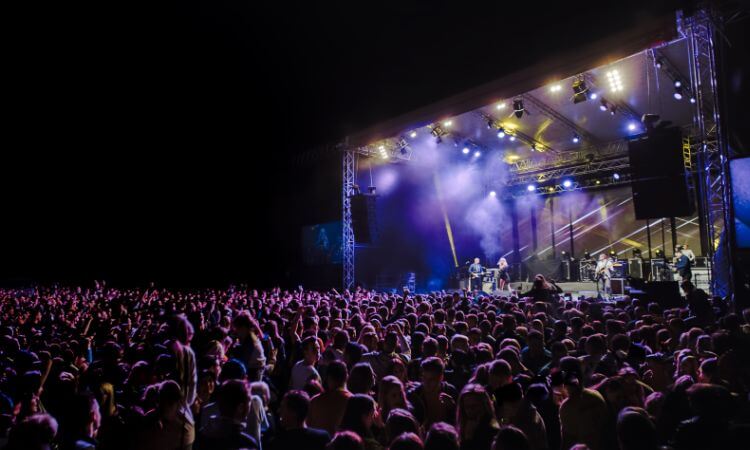
The music industry is an enchanting realm where talented artists captivate audiences with their melodies and performances.
As fans eagerly await the opportunity to witness their favorite singers live, it raises the question: How much do singers make? or more so How much do these singers make per concert?
In this blog post, we’ll explore the various factors that contribute to a singer’s income, and sources of their earnings, and provide valuable insights into the financial aspects of their profession.
How Much Do Artists Get Paid Per Concert?
Paying musicians for concerts involves juggling various factors. Major artists with huge fan bases earn millions per show as festival headliners and arena fillers.
Mid-level artists earn between $10,000 to $50,000 per show, based on location and venue size—respectable figures within the music industry.
Smaller gigs, like local bands in clubs, pay a few hundred to a couple thousand dollars, often struggling to cover costs.
Expenses include band member payments, crew salaries for stage setup and technical aspects, and varying venue rental costs.
Travel expenses for band and crew add up, including flights, accommodations, and ground transport.
Production costs for impressive stage setups and effects are significant but impactful.
After expenses, musicians’ take-home pay isn’t always substantial, as a substantial portion is reinvested in the show.
Income Levels of Singers
Singers’ income per concert can vary significantly depending on factors such as their popularity, experience, genre, and the venue’s capacity.
Established and renowned artists with solid fan bases can command higher fees for their performances.
On average, singers earn anywhere from a few thousand dollars to millions per concert.
Top Sources of Income for Singers
Performance Fees: One of the primary sources of income for singers is the performance fees they receive for their live shows. These fees are negotiated between the singer’s management and the event organizers, taking into account factors like the venue, audience capacity, and market demand. Singers often charge higher fees for private or corporate events compared to public concerts.
Touring and Concert Tours: Singers often embark on tours, performing in multiple cities or countries over some time. Concert tours can generate substantial income for singers as they sell tickets for multiple shows, merchandise, and sponsorships. The revenue from touring is influenced by ticket sales, merchandise sales, and other ancillary revenue streams, such as VIP packages and meet-and-greet experiences.
Record Sales and Streaming: Singers can also earn income through record sales, both physical and digital, as well as streaming platforms. While the music industry has shifted towards digital consumption, artists still earn royalties based on the number of streams and downloads their music generates. However, it’s important to note that the income from record sales and streaming may vary greatly depending on the singer’s contractual agreements with record labels and streaming platforms.
Merchandise and Brand Collaborations: Singers often capitalize on their popularity by selling merchandise such as T-shirts, albums, posters, and other branded products during concerts and through online stores. Additionally, they may collaborate with brands and endorse products, further adding to their income.
Licensing and Royalties: Singers can earn additional income by licensing their music for use in movies, TV shows, commercials, and other media. These licensing deals and royalties contribute to their overall earnings.

Factors Influencing Income Per Concert
Popularity and Demand: Singers who enjoy significant popularity and have a large and dedicated fan base tend to earn more per concert. The demand for their performances allows them to negotiate higher fees.
Venue Capacity: The size and capacity of the venue play a crucial role in determining a singer’s income. Larger venues with higher seating capacities can accommodate more fans, resulting in increased ticket sales and higher revenue.
Production Costs: The expenses associated with concert production, including stage setup, lighting, sound equipment, and the size of the supporting team, can impact a singer’s income. Higher production costs might result in a smaller portion of the revenue being allocated to the artist’s earnings.
Managerial Agreements: Singers often work with managers or booking agents who negotiate contracts and fees on their behalf. The terms of these agreements, including commission rates and contractual obligations, can influence the artist’s earnings.
Conclusion
While the income of singers per concert can vary greatly, it is evident that successful artists have the potential to earn substantial amounts from their live performances.
Performance fees, touring, record sales, streaming, merchandise, brand collaborations, licensing, and royalties contribute to their overall income. Factors such as popularity, venue capacity, production costs, and contractual agreements play a significant role in determining their earnings.
The allure of witnessing beloved singers live continues to draw audiences, making concerts an essential part of an artist’s revenue stream in the dynamic world of the music industry.
Remember, behind the mesmerizing melodies lies a business that balances artistic expression with financial viability.
FAQs About Concert Earnings
No, the income of singers per concert can vary significantly. Established and popular artists with a large fan base and high demand can command higher fees than emerging or less-known singers.
Singers can have various income sources apart from concerts and streaming. These can include merchandise sales, such as T-shirts, albums, and posters sold during concerts or through online stores. Additionally, singers may engage in brand collaborations, endorse products, or appear in advertisements.
READ:
How To Promote A Concert: Get Fans To Your Music Show On Budget
Music Marketing Strategy: The Guide To Successful Music Marketing










![Wong Diane – Now Only Me (Single Review) Wong Diane Now Only Me [Single Review]](https://musicreviewworld.com/wp-content/uploads/2023/08/Wong-Diane-Now-Only-Me-Single-Review-1-356x220.png)



